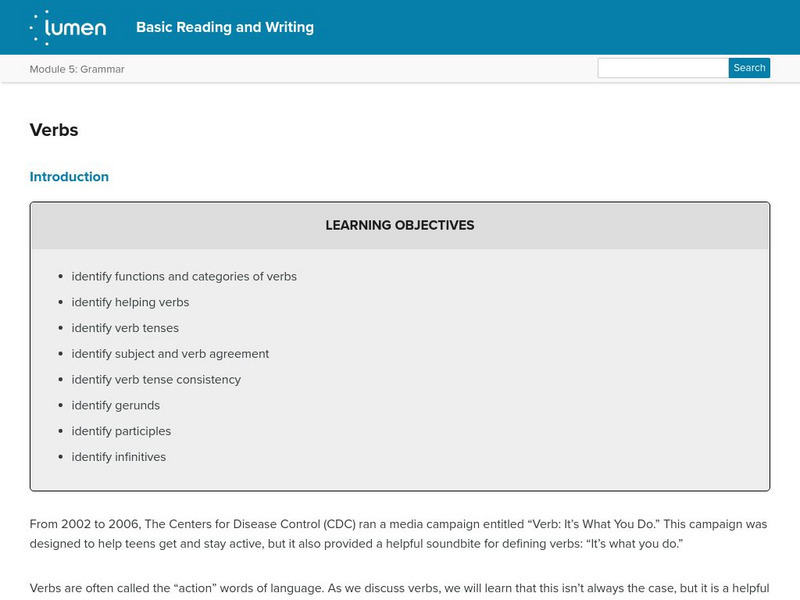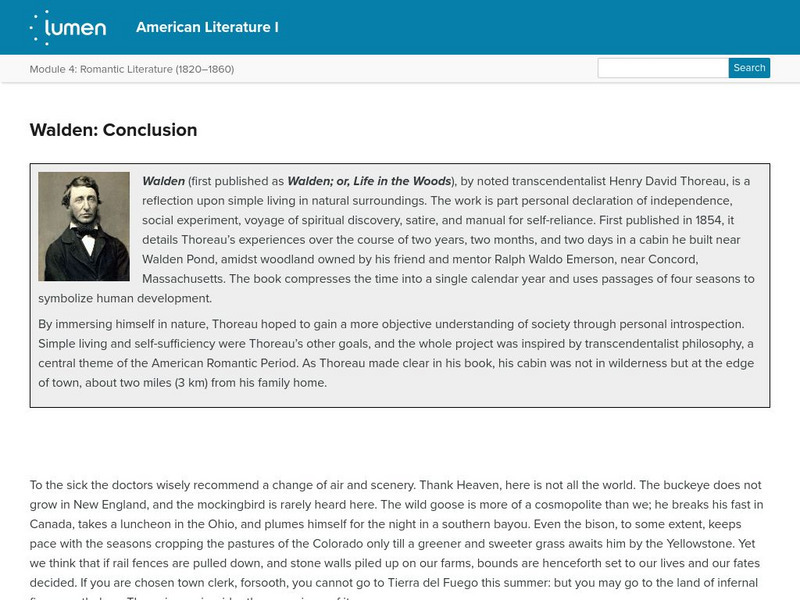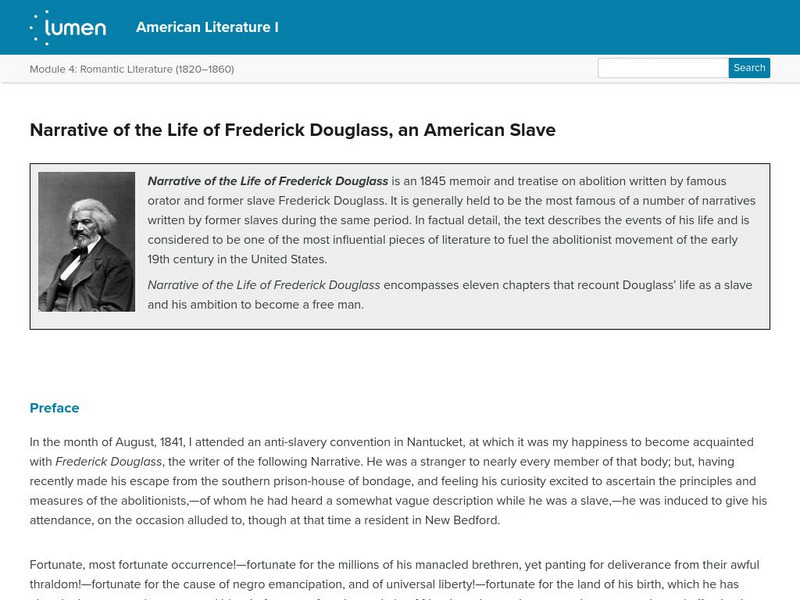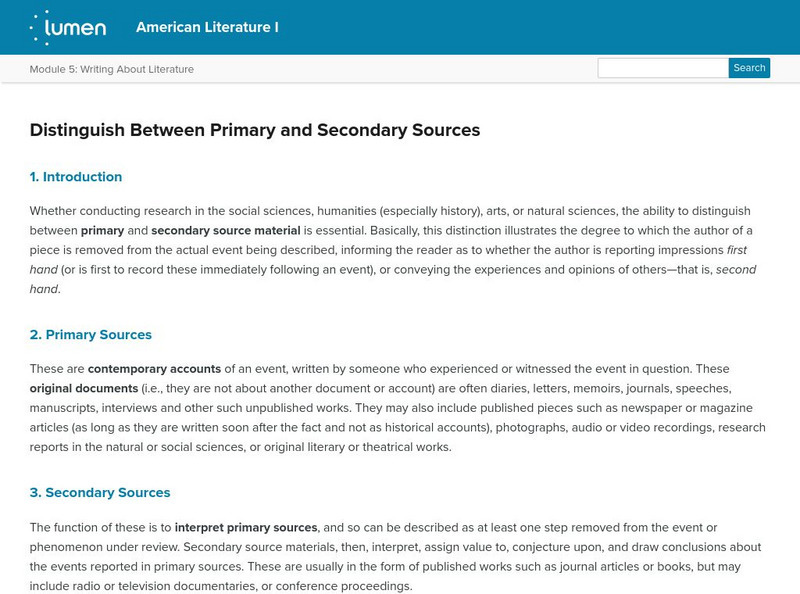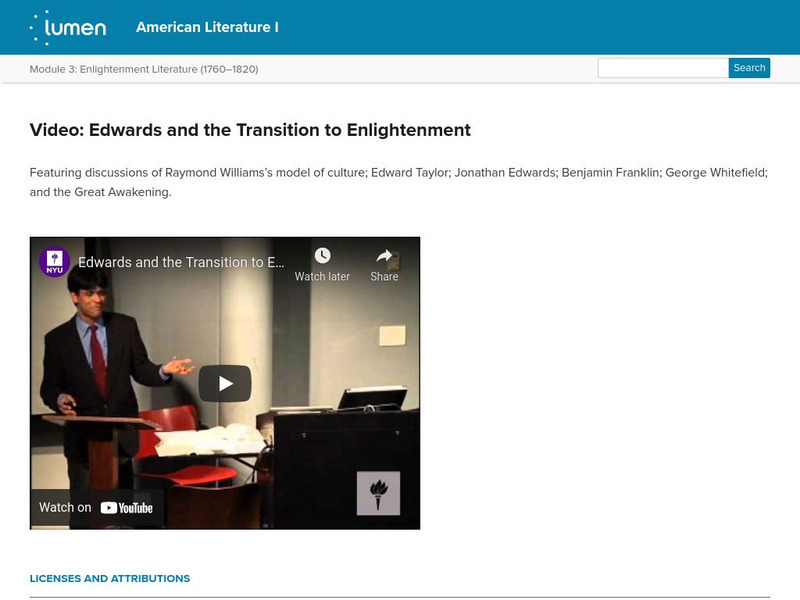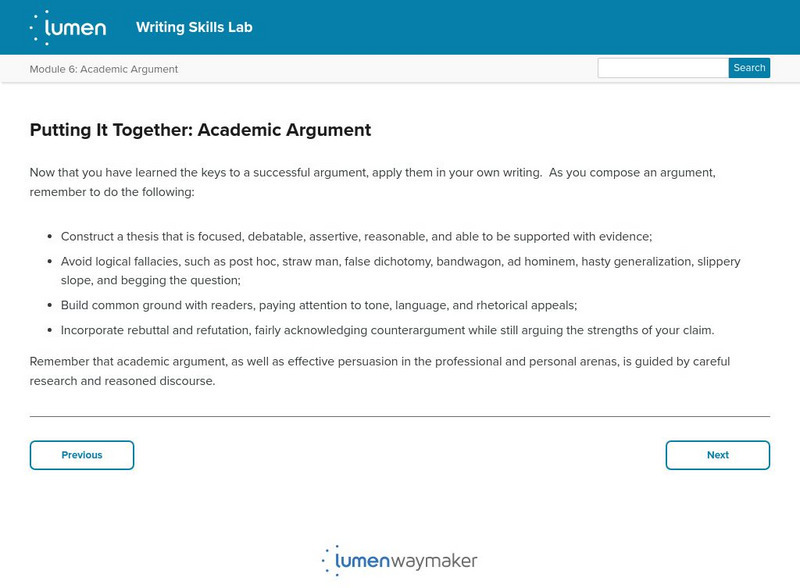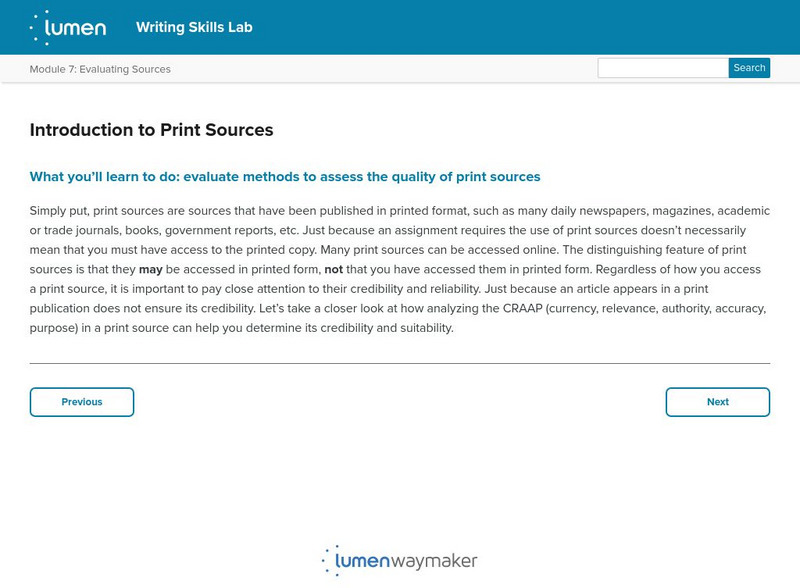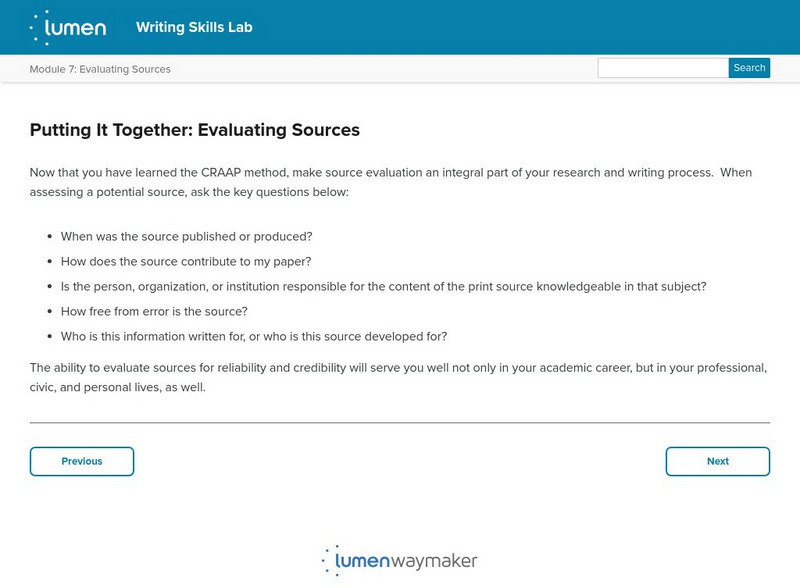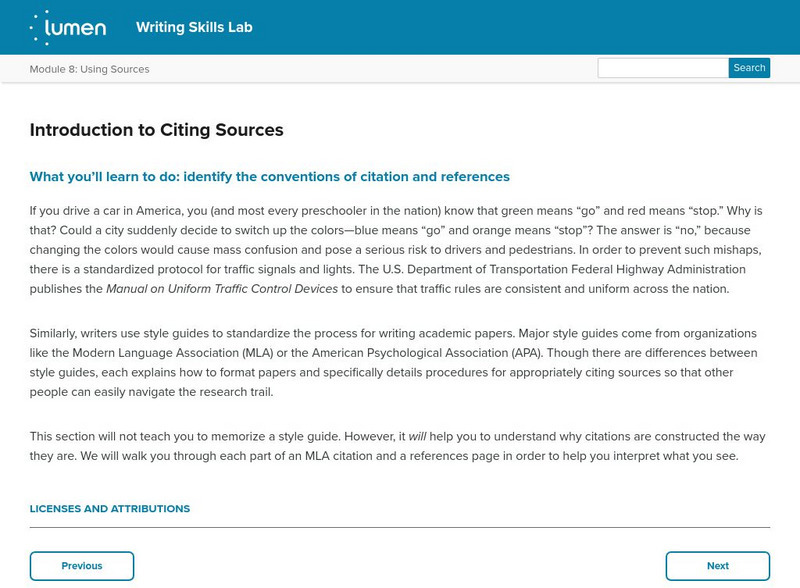Lumen Learning
Lumen: Grammar: Verbs
This instructional activity focuses on verbs including functions and categories of verbs, types of verbs, irregular verbs, verb tenses, tense consistency, subject-verb agreement, verbals, and a variety of verb practice activities. It...
Lumen Learning
Lumen: Grammar: Try It: Verbs
This is a non-graded verb practice including categorizing, agreement, and non-finite clauses.
Lumen Learning
Lumen: Walden: Where I Lived, and What I Lived For
This is the text and audio of Chapter 2.2 of Walden by transcendentalist Henry David Thoreau. It focuses on where he lived and what he lived for.
Lumen Learning
Lumen: American Romanticism: Walden: Conclusion
This is the text of Chapter 18 of Walden by transcendentalist Henry David Thoreau. By immersing himself in nature, Thoreau hoped to gain a more objective understanding of society through personal introspection. Simple living and...
Lumen Learning
Lumen: Narrative of the Life of Frederick Douglass, an American Slave
This is the text and audio of the autobiography Narrative of the Life of Frederick Douglass, an American Slave by Frederick Douglass. This 1845 memoir and treatise on abolition encompasses eleven chapters that recount Douglass' life as a...
Lumen Learning
Lumen: Distinguish Between Primary and Secondary Sources
This lesson focuses on distinguishing between primary and secondary sources and evaluating them. It includes a list of questions to ask to determine the value of the sources under consideration.
Lumen Learning
Lumen: Using Databases: Periodical Indexes and Abstracts
This lesson focuses on using databases: periodical indexes and abstracts including the differences between periodical and journals, selecting the right number of keywords, and full-text databases.
Lumen Learning
Lumen: Finding and Evaluating Research Sources
This lesson focuses on how to find, evaluate, and use primary and secondary sources using printed and online sources. It provides practice writing activities such as examining the same topic through primary and secondary sources and...
Lumen Learning
Lumen: Writing About Literature: Finding Literary Criticism
This article focuses on how to find literary criticism including scholarly journals, citations from other works, a list of useful links to find sources, and TAMU libraries' website.
Lumen Learning
Lumen: Using Modern Language Association (Mla) Style
This lesson focuses on using Modern Language Association (MLA) Style including the major components of a research paper written using MLA style, reasons to use MLA Style, formatting an MLA paper, general MLA guidelines, a comparison of...
Lumen Learning
Lumen: Reading and Interpreting Literary Texts: How to Analyze a Short Story
This lesson focuses on analyzing a short story including all of the elements of a short story such as setting, plot and structure, and characterization.
Lumen Learning
Lumen: Multimodality: The Five Modes of Communication
This lesson focuses on the five modes of communication: visual, linguistic, spatial, aural, and gestural along with examples of each.
Lumen Learning
Lumen: Examples of Multimodal Texts
This lesson focuses on providing examples of multimodal texts, those using more than one mode of communication in the same text.
Lumen Learning
Lumen: What Are Remediation and Remix?
This lesson focuses on remediation and its definition and forms of remediation with examples. It also provides a practice exercise.
Lumen Learning
Lumen: Multimodality: Remix and Attribution
This lesson focuses on defining remix, why attribution is important in a remix, and how to attribute fairly. It also provides a table, Limitations When Remixing Copyrighted Work, and a practice exercise. CCSS.ELA-Literacy.CCRA.W.8
Lumen Learning
Lumen: American Literature: Video: Edwards and the Transition to Enlightenment
Use the video "Edwards and the Transition to Enlightenment" to consider the two learning outcomes below. It featuring discussions of Raymond Williams's model of culture; Edward Taylor; Jonathan Edwards; Benjamin Franklin; George...
Lumen Learning
Lumen: Critical Reading: Supporting Claims
This lesson focuses on supporting claims including the distinction between main ideas and supporting details, relationship between purpose and supporting details, sufficient and related support, and support and elaboration. W.9-10.1a...
Lumen Learning
Lumen: Writing Skills: Introduction to Effective Introductions and Conclusions
This article provides an introduction to identifying strategies for writing effective introductions and conclusions. Click next on the bottom right to continue.
Lumen Learning
Lumen: Academic Argument: Introduction to Argumentative Thesis Statements
This introduction focuses on evaluating argumentative thesis statements. Click on the Next link at the bottom right for more information.
Lumen Learning
Lumen: Academic Argument: Logical Fallacies
This introduction defines logical fallacies and lists reasons to avoid them. Click next at the bottom of each page for more information about fallacies.
Lumen Learning
Lumen: Writing Skills: Putting It Together: Academic Argument
This is a summary of the academic argument learning objectives including constructing a debatable thesis statement, avoiding logical fallacies, building common ground with readers, and incorporating rebuttal and refutation.
Lumen Learning
Lumen: Evaluating Sources: Introduction to Print Sources
This is an introduction to evaluate methods to assess the quality of print sources such as daily newspapers, magazines, academic or trade journals, books, government reports, etc.
Lumen Learning
Lumen: Evaluating Sources: Putting It Together: Evaluating Sources
This is a summary of evaluating sources using the CAARP analysis method including questions to ask yourself about each source. W.9-10.8 Sources
Lumen Learning
Lumen: Using Sources: Introduction to Citing Sources
This is an introduction to citing sources and used in your paper. It includes the need to choose the proper method of citation based on the field of study: Modern Language Association (MLA) or the American Psychological Association (APA).


